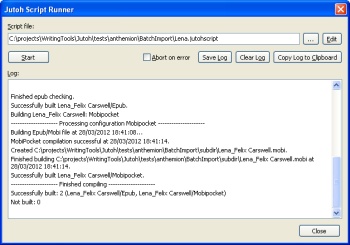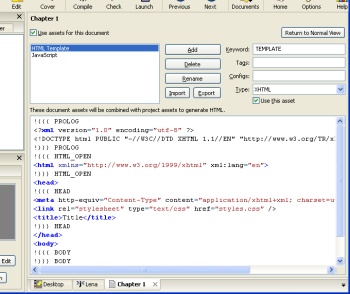What is Jutoh Plus?
What can scripting be used for?
What operations are possible in a script?
Where is scripting documented?
What can I use HTML templates for?
Can I edit HTML templates within Jutoh?
Can I test Jutoh Plus with the standard demo?
Do I need to download a separate Jutoh version?
Sample scripts
Jutoh Plus is an enhanced edition that has several extra features:
Jutoh Plus is aimed particularly at publishers who edit a large number of books, although individuals may well find the custom checking feature justifies the upgrade, since it can save hours of work and identify hard-to-spot typos.
Scripts allow automation of tasks such as creating a Jutoh project, replacing content, setting metadata and configuration properties, and ebook generation. Scripts are not procedural and instead comprise groups of property/value pairs.
The HTML template system allows you customise ebook sections per section or project-wide, with the ability to edit and include JavaScript code and extra CSS.
The HTB/CHM creation feature lets developers add application help to wxWidgets or Windows applications as well as export Epub/Kindle/ODT files from the same project.
The custom checking feature lets you create libraries of presets that can match against issues in your projects, alerting you of issues such as blank paragraphs, suboptimal formatting, clichés and over-used words, commonly-used double words, and so on. This is a powerful proofing tool for saving time and increasing the quality of your books. You can also apply find and replace presets to a project, including automatically during import, so this allows quick transformation of content and formatting to your house standards. For more on this, please see the topic Working with custom checking in the application help, or Chapter 25: Using Jutoh's Proofing Tools in Master Digital Publishing with Jutoh 3.
The personalisation feature allows bulk creation of customised books using a data file of information, via the Book | Batch Compile command. A typical use for this is when you are sending out advance copies and wish to discourage readers from distributing the book: you can add the customer's name and other details to the title page, for example. This feature is easy to set up and does not involve scripting.
The topics below give a flavour of what you can do with the scripting and HTML template features of Jutoh Plus; for more details, you can read the full Jutoh Plus Guide.

These capabilities are especially useful when you are dealing with many ebooks. One scenario is coordinating incoming content that is formatted in DOCX or ODT to your specifications. You can outsource the editing to people who just use a regular word processor and who don't have to know how Jutoh works. You can then use scripts to convert the files you receive into Jutoh projects and various ebook formats, adding standard copyright notices, extra content, and covers; all without a lot of time-consuming manual operations.
Another use is to stamp a book with the customer's name to discourage redistribution or to make it more personal. This could be done on a web server, if necessary using a virtual X server such as Xvfb since Jutoh still needs a notional display to be present.
This is what you can do in a script:
Scripting is documented solely in the Jutoh Plus Guide, which you can find here.
These are some of the uses for the template system:
 Yes, Jutoh has a built-in code editor. HTML templates are organised as 'assets' (fragments of text) which means you can divide up your code into parts that are then spliced into the main HTML template using special block markers. Code can come from the document assets or the project assets, and can be configuration-dependent, allowing a lot of flexibility for modular organisation and the reuse of a single project for targeting platforms with differing capabilities.
Yes, Jutoh has a built-in code editor. HTML templates are organised as 'assets' (fragments of text) which means you can divide up your code into parts that are then spliced into the main HTML template using special block markers. Code can come from the document assets or the project assets, and can be configuration-dependent, allowing a lot of flexibility for modular organisation and the reuse of a single project for targeting platforms with differing capabilities.
There is a new type of document, the source code document, which will embed files into the ebook that you can then reference from HTML templates. It too can be configuration-dependent.
Note that you can't edit the HTML that Jutoh generates, except by replacing it on a permanent basis. Normally, the generated HTML is inserted into the template when the ebook compilation. You can choose to remove the block marks and edit the HTML directly but it won't be regenerated.
Yes, you can use the demo to try scripting and HTML templates. If you currently have a Jutoh licence, you test the Jutoh Plus features using the command Help | Try More Features.
No, you simply unlock the extra facilities by purchasing a licence for Jutoh Plus or for the upgrade to Jutoh Plus. You can then enter the registration details via Help | Register Jutoh.
The Jutoh sample script can be found here. It demonstrates a variety of import and replacement operations.
This sample Jutoh project containing custom JavaScript can be found here.
To view the JavaScript components, use the View | Asset Editor command.
It has been tested on the following Epub 3 readers:
Copyright © Anthemion Software, 2020